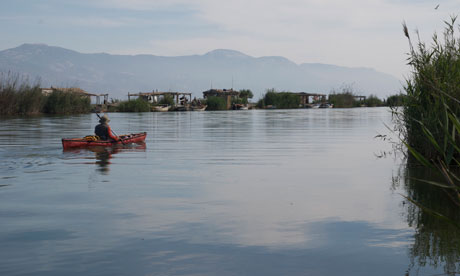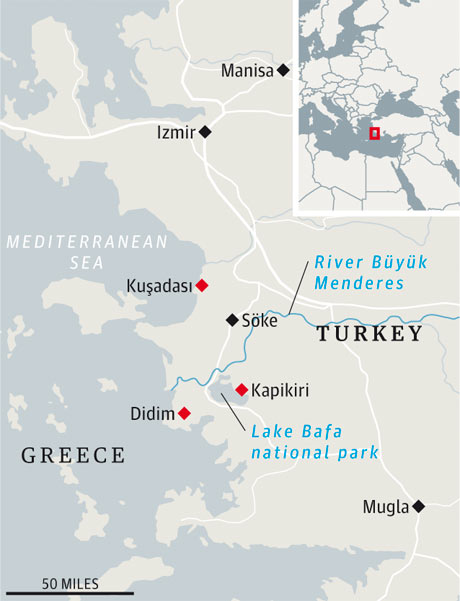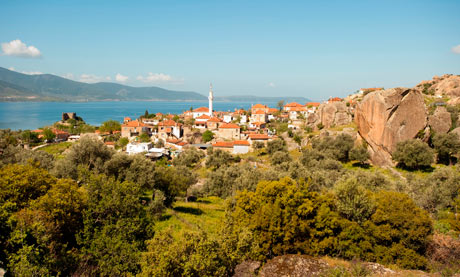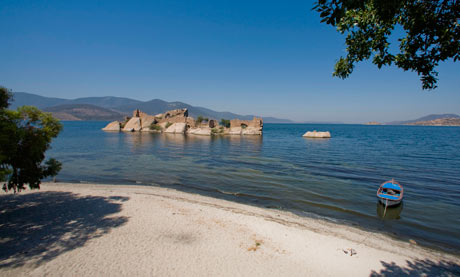During a month-long canoe trip down the length of Turkey’s Meander river, Jeremy Seal rests in a tiny town big on history and hospitality that becomes one of the highlights of his journey
-
Jeremy Seal
- The Guardian

I left the river where it nearly met the lake, and dragged my filthy and battered canoe across the single field that lay between them. For a month, I had been travelling the Meander river, as it was known in classical times – it’s now called the Büyük Menderes. I’d followed every last bend of it, from its source in the uplands of western Turkey to where it empties into the Aegean.
The expedition had paid off in history and hospitality – two of Turkey’s strengths. All along this fabled valley – scattered with ruins of King Xerxes, Alexander the Great, campaigning Byzantine emperors, Crusader kings and raiding Turkish sultans – locals who were kindly if bemused had unfailingly put me up, fed me and helped me on my way.
The problem was that the solo travelling had been as tough on me as on my canoe – what with the nights spent in welcoming but basic village houses, forestry huts and pumping stations, the original winding river had done me in.
On my approach to the coast, where the Meander delta meets the Aegean between the resort towns of Didim and Kusadası, I had begun to doubt that I could stay the course. A well-earned break was called for, which explains the short portage I was now making towards Bafa lake, a protected natural park, and to the haven of Kapıkırı, on its eastern edge.
Travellers unfamiliar with Turkey tend to the binary assumption that they must expect either concrete resort sprawls – think precisely of Didim or Kusadası – or a mountainous interior associated with Islamic traditionalism and poor plumbing. The truth is that a gloriously rewarding course can often be steered between the two – and it leads straight to places like Kapıkırı.
 I paddled down the pristine lake within its hem of hazed mountains, passing island heronries topped by the crumbling crenellations of fortified Byzantine monasteries, and ran my canoe ashore on Seychellois-white sands of powdered shell.
I paddled down the pristine lake within its hem of hazed mountains, passing island heronries topped by the crumbling crenellations of fortified Byzantine monasteries, and ran my canoe ashore on Seychellois-white sands of powdered shell.
This glorious beach could have been a shoe-in for sun loungers and parasols, but it lay deserted except for a shawled villager who had been collecting the driftwood now stacked on the back of her donkey. I shoved my canoe in among the faded fishing caïques with their high prows and looked beyond the beach to where a magnificent set of city walls rises from olive groves around the ancient harbour city of Heraclea. Complete with parapets, posterns and ramparts, they date from the third century BC. I walked among ruined colonnades and temples, tottering arches and ashlar tiers, and scattered blocks of carved frieze to find myself among the makeshift stone cottages and tended kitchen gardens of the site’s present-day occupants.
Heraclea has been left to Kapıkırı’s farmers and fishing folk to picturesque effect. In most of Turkey’s ancient cities a museum service in thrall to the tidying tendency has cleared away rustic communities.
The place exists on its own terms, without boutiques, bars or interpretive centre, where subtler pleasures include clocking the casual ways in which ancient Heraclea’s stones have been customised by present-day Kapıkırı – as garden tables and as tether posts for donkeys. Or even as a boot jack: I watched an arthritic elderly man ease off a worn leather heel against a column drum at his front door, finding a functional use for the stone’s fluted corner which its ancient carver probably never anticipated.
By the agora, the main square of the village from ancient times to now, and the site of the football pitch, is the Agora Pansiyon. As with the village’s other pansiyons, this family-run guesthouse has for years been attracting refugees from the busy resorts – history buffs, birders, botanists and hikers.
 Kapıkırı village, on Bafa lake. Photograph: AlamyIn its shaded grounds, I found a hammock-slung terrace and a cushion-strewn kösk, a traditional raised lounging platform. The timbered interiors were hung with binoculars and stacked with books about the region. My immaculately clean room was light, spacious and television-free. This cultured country lodge also boasted an excellent and generous kitchen, as I discovered over a dinner of salted eel, lentil soup, lake-caught bass, and a potato and dill salad soused in the family’s own olive oil.
Kapıkırı village, on Bafa lake. Photograph: AlamyIn its shaded grounds, I found a hammock-slung terrace and a cushion-strewn kösk, a traditional raised lounging platform. The timbered interiors were hung with binoculars and stacked with books about the region. My immaculately clean room was light, spacious and television-free. This cultured country lodge also boasted an excellent and generous kitchen, as I discovered over a dinner of salted eel, lentil soup, lake-caught bass, and a potato and dill salad soused in the family’s own olive oil.
Orhan Serçin, owner of the pansiyon, and a former mayor of Kapıkırı, advised me that my first priority must be the mountain, the myth-haunted Latmos (Besparmak to the Turks), which rises directly behind the village.
“It’s why most visitors come,” he said. “The landscapes are like nowhere else, and the history is extraordinary – prehistoric, classical and medieval all at once, with plenty of myth for good measure.”
I saw what he meant the following morning when Mithat, his son, guided me up through orchid meadows and olive groves, past gates fashioned from old sticks, to house-high boulders, which the elements had hollowed out over the ages.
Within these surreal caverns Mithat showed me ochre and red cave paintings said to be some 8,000 years old. At the ruined monastery of Yediler we picnicked on cheese, olives and enormous tomatoes, close to a hermit’s cave, its walls frescoed with a vivid crucifixion scene.
We completed this outstanding hike by descending to the lake-side temple dedicated to Endymion, the mythical shepherd whom the moon goddess serially seduced on the heights of this holy mountain.
One afternoon I returned to the lake and paid a fisherman to ferry me to the deserted beach at Ikizada, where I swam in the lightly brackish waters (the lake was a gulf in the Aegean until the sea passage silted up) and dozed in the shade of oleanders before pottering among the Byzantine ruins on the headland.
 Byzantine ruins in Bafa lake. Photograph: AlamyAnother day I found my way up the verbena-scented kral yolu or royal way, a mountain road as old at least as the city walls and paved with super-sized cobbles, an extraordinary engineering feat. The road had once carried the armies of Alexander’s generals, and the villagers now use it for bringing in the olive harvest. It was a particular pleasure to wander the lanes of the village where farmsteads and smallholdings abutted the old walls and cattle grazed the tumbled tiers of the overgrown theatre.
Byzantine ruins in Bafa lake. Photograph: AlamyAnother day I found my way up the verbena-scented kral yolu or royal way, a mountain road as old at least as the city walls and paved with super-sized cobbles, an extraordinary engineering feat. The road had once carried the armies of Alexander’s generals, and the villagers now use it for bringing in the olive harvest. It was a particular pleasure to wander the lanes of the village where farmsteads and smallholdings abutted the old walls and cattle grazed the tumbled tiers of the overgrown theatre.
In the afternoons I dozed in the hammock to the clack of the rummy players from the village tea house. I fell asleep each night to lowing and barking, and woke to the call of the village muezzin, and amid the history and the hospitality, I stayed until I had recovered to the point of facing my canoe again.
On my final morning Ozgun, Orhan’s wife, served an epic home-produced breakfast of bread, yoghurt, eggs and a bewildering variety of jams. Heavily ballasted, I returned to the river and continued downstream to another historic highlight – the ancient port of Miletus, once the greatest city in the Greek world – and from there to my journey’s end at the Aegean. After my stay at Kapıkırı, one of the most evocative spots in Turkey, I was ready for the final leg of my long meandering.
• Meander; East to West Along a Turkish River, by Jeremy Seal (Chatto, £16.99). To buy a copy for £13.59 with free UK p&p go toguardianbookshop.co.uk. Jeremy will be talking about his trip at theKings Place Travel Festival on 23 June. Other speakers during the two-day festival, including Michael Palin, Sara Wheeler, Barbara Nadel and chef Atul Kochhar, will explore the world from England’s bramble-lined pathways to the vast, empty expanse of Antarctica through food, music, crime-writing and their own journeys
Way to go
Getting there
EasyJet (easyjet.co.uk) flies to Bodrum from various UK airports. Pegasus Airlines (flypgs.com) flies to Bodrum from Gatwick and Stansted
Where to stay
Agora Pansiyon (+90 252 543 5445, agorapansiyon.com) has doubles from €100 per night, half board. Kaya Pansiyon and Restaurant (+90 252 543 5380, bafalake.net) has doubles from around £29 a night half-board

https://www.theguardian.com/travel/2013/mar/22/turkey-canoeing-meander-river-buyuk-menderes

Leave a Reply